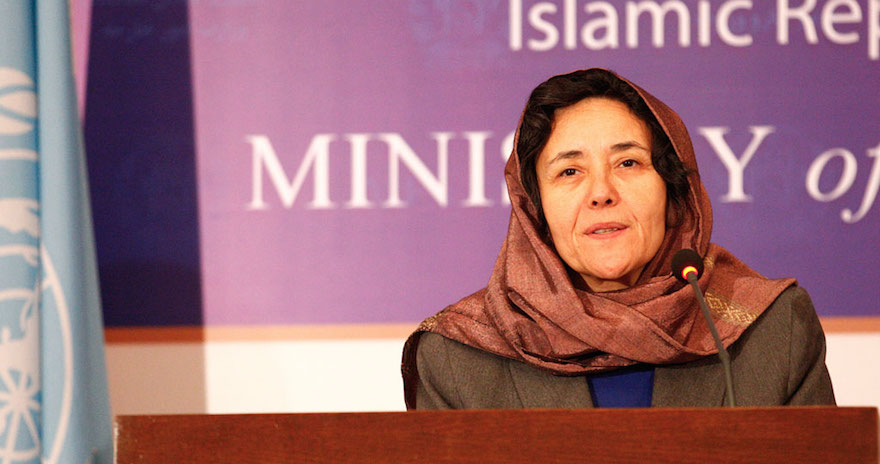NEW YORK (IDN) – While expressing serious concern about the detention of children recruited as soldiers by the Taliban and other non-state armed groups, in a high security facility for adults, the United Nations has urged the Afghan authorities to treat them primarily as victims and in accordance with juvenile justice standards.
“This is not a place for children . . . There should be no debate about the fact that juvenile justice standards should apply to these children,” said Leila Zerrougui, the Special Representative of the UN Secretary-General for Children and Armed Conflict.
She also expressed concern about the large increase in the number of UN verified cases of child recruitment in Afghanistan in 2015 and called for a general prohibition of underage recruitment and use.
At the same time, she welcomed the Afghan government’s recommitment to fully implementing the Action Plan to end and prevent the recruitment of children in the national security forces.
The Afghan government reiterated its commitment during a mission by Leila Zerrougui to Afghanistan from February 13 to 17 to assess the situation of children affected by the armed conflict and to engage with authorities and partners on the protection of boys and girls.
She met with President Ashraf Ghani, Chief Executive Abdullah Abdullah, Vice President Mohammad Sarwar Danish, and key ministers, as well as with the Afghan Independent Human Rights Commission, the North Atlantic Treaty Organization (NATO), the diplomatic community and UN and non-governmental organization partners.
“The political will and progress I have seen on the ground are encouraging. The Government’s commitment will be instrumental to turn the page on the recruitment and use of children in the Afghan National Security Forces (ANSF),” declared the Special Representative.
Leila Zerrougui commended the launch of national age assessment guidelines as well as the Presidential decree criminalizing the recruitment and use of children in the ANSF, and stressed that effective implementation and enforcement of these tools are critical to prevent recruitment and use.
While recognizing progress made to end underage recruitment in the Afghan National Police (ANP) and Afghan National Army (ANA), the UN special envoy raised concern regarding the lack of oversight of recruitment processes for the Afghan Local Police (ALP).
In Herat, Leila Zerrougui visited a child protection unit located in the ANP recruitment centre and heard about its positive impact to prevent underage recruitment. Welcoming the recent establishment of two new child protection units in Mazar-e-Sharif and Jalalabad, the Special Representative called for support to set up such units within ANP recruitment centres across the country’s 34 provinces.
Ahead of key donor conferences this year, she urged the Government and its international partners to dedicate resources to support the full implementation of the Action Plan, including reintegration programmes, and to address root causes such as lack of opportunities for young people.
In its annual report, released on February 14 in Kabul, the United Nations Assistance Mission in Afghanistan (UNAMA), said that an average of 53 children were killed or injured every week in 2015, the highest number since 2009, when the UN began systematically documenting casualties.
The majority of child casualties was attributed to ground engagement between parties to conflict. There was also an increase in deaths and injuries attributed to airstrikes by Afghan and international forces.
“The current security situation is creating great challenges to protect children,” said the Special Representative. “I call on all parties to respect international humanitarian law and to take all precautions to reduce the impact of conflict on children.”
During her meetings with the authorities, Leila Zerrougui highlighted the importance of protecting schools and hospitals. She noted that schools, particularly girls schools, continue to close their doors due to insecurity and direct threats by non-state armed groups.
“I commend the Government for signing the Safe Schools Declaration. In the context of the challenges for access to education in Afghanistan, we must work together to ensure that schools are protected from attack and military use. The next generation could be compromised if we cannot protect children’s rights to health and education,” said the UN special envoy.
She also discussed with authorities the practice of bacha bazi, or dancing boys, and is looking forward to the criminalization of this practice in forthcoming legislation.
The Special Representative concluded that strengthening the rule of law and addressing impunity are not only key elements to the success of the Action Plan to end and prevent the recruitment of children, they are also essential to improve the protection of children in Afghanistan.
Afghanistan is one of seven countries involved in the campaign Children, Not Soldiers. In 2011, the Government signed with the UN an Action Plan to end and prevent the recruitment and use of children in its national security forces, and a road map to compliance was endorsed in August 2014. The Country Task Force on Monitoring and Reporting, co-chaired by the UNAMA and UNICEF, is working with the Government to support full implementation of the Action Plan. [IDN-InDepthNews – 20 February 2016]
Related IDN article: Women and Children Worst Hit in Afghanistan Conflict
IDN is flagship of the International Press Syndicate.
Photo: UN Special Representative for Children and Armed Conflict, Leila Zerrougui addressing a press conference in Kabul on February 19. Credit: UNAMA/Fardin Waezi

